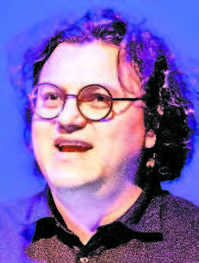Co-Cathedral of St. Joseph Music Director Alejandro Zuleta is preparing for the premiere of his highly

anticipated “El Oratorio Panhispánico,” an inspired new take on the Passion of Christ through the lens of Hispanic immigrants.
Zuleta’s ministry, Music at Co-Cathedral, will present “El Oratorio Panhispánico” on Friday, March 31, and Saturday, April 1st, at 7:30 p.m. at the Co-Cathedral of St. Joseph at 856 Pacific Street in Prospect Heights.
Zuleta composed the piece entirely in Spanish through the poetic form of “décimas,” and the music utilizes a mix of contemporary classical sound and Latin American musical genres from Argentina, Mexico, Colombia, Peru, Chile, Cuba, and Venezuela, among others.
The fully staged production is directed by Daniel Irizarry and will include 12 singers and an 11-piece band that combines classical and traditional Latin American instruments.
Zuleta is an acclaimed conductor, organist, pianist, and composer. He was born and raised in Bogota, Colombia, and grew up in a traditional musical family. He studied musical composition in Colombia and moved to New York 10 years ago, where he began his conducting career at the Manhattan School of Music.
The setting for “El Oratorio Panhispánico” is the border between Mexico and the United States, where a group of immigrants from all over Latin America have gathered to pray the rosary and to reflect upon the sorrowful mysteries through story and song.
It begins in the Garden of Gethsemane, where Jesus is arrested by the mob. He is then brought to Caiaphas, who says, “It is good that one man dies for the people.” Peter follows Jesus and witnesses Caiaphas’ words.
Peter is then questioned as to whether he is one of Christ’s disciples, and he denies Jesus three times. Jesus is then brought to Pilate, who initially is not in favor of crucifying him. But as the trial ensues, Pilate is convinced by the mob, and Jesus is sentenced to be crucified.
As Christ dies on the cross, the group of immigrants remember their loved ones, especially the ones that have died along their journey to the U.S., and spontaneously begin to say the names of those who have passed, forming a river of names with their voices.
According to Zuleta, in this “El Oratorio Panhispánico,” the Passion of Christ serves as a mirror to our own personal identities as migrants, immigrants, sons, daughters, and grandchildren of immigrants — both in the wonderful and unique ways in which we share, celebrate, and blend our cultures and also in the heartbreak that accompanies our stories.
“I wrote this oratorio as a way of resisting the consolidation of biased stereotypes about race and identity,” explained Zuleta. “I hope to accomplish this by using the material to explore the contradictory realities that emanate from human migration.
“On the one hand, migration makes possible the creation of new and unique expressions of culture, richness, and beauty,” Zuleta said. “On the other hand, there is the heartbreak that comes by being seen through biased stereotypes and treated as outcasts.”
Zuleta came up with the idea for the production one year ago as a means to bring a deeper element of multiculturality to the cathedral. “The first thing that crossed my mind was to do it in ‘décimas,’ which is the base poetry that is part of every culture in Latin America,” he explained.
St. Joseph Associate Music Director Cristina Maria Castro, who has worked at St. Joseph’s since 2018 and has the role of Decimista Soprano, said that she was proud to be working on this project.
“Alejandro told me about his concept for ‘El Oratorio Panhispánico’ over the summer, and I was immediately blown away. I do not know of any other musical work like this, and I knew we had to share this with the world,” Castro explained.
After completing the work, Zuleta and Castro took some demos they had made to St. Joseph’s Co-Cathedral rector, Father Christopher Heanue, who was thrilled to hear it.
“What I’m especially appreciative of is that I try to allow the co-cathedral to be a place where creativity is fostered and where we take the gifts and talents that people have and utilize them,” Father Heanue said. “So, having this forum allows the opportunity for Alejandro to compose and create this work of art, and it is really, really beautiful.”
